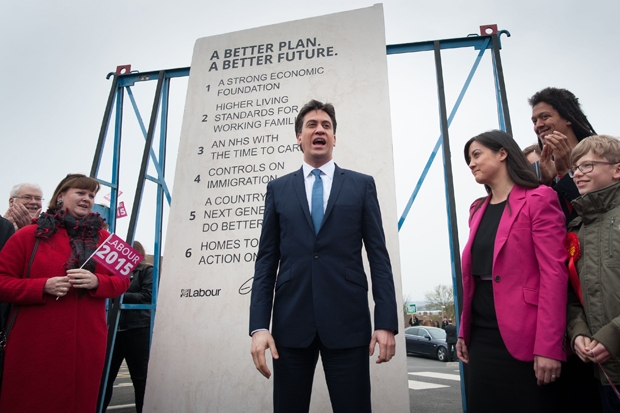Ed Miliband’s general election campaign was clearly dysfunctional, but now we have an insight into just how bad it was. The Guardian’s political editor Patrick Wintour has produced a fantastic long read on the undoing of Miliband, revealing the fear and loathing inside his operation. The piece is such a fascinating read it’s worth buying a copy of the paper for. If you aren’t able to make it to a newsagent, here’s a summary of the five most interesting things we’ve learnt from it.
1. The Edstone went through ten approval meetings
The Edstone (pictured above) will be Miliband’s legacy. If he is remembered for nothing else, it will be for engraving his pledges onto a 8ft 6in piece of limestone. Incredibly, Wintour reveals that the stone wasn’t an off-the-cuff ill-advised decision:
‘The only reason it got through 10 planning meetings was because we were all distracted, looking for a way to punch through on the SNP’
Plans were even drawn up to break it up and sell the pieces in the instance of a Labour defeat. Sadly this has yet to happen. His advisers even likened it to the Berlin Wall:
‘The stone’s demolition, in the event of a Labour loss, had been agreed at the time it was commissioned. After the election, the party drew up two plans for its disposal: one was simply to smash the stone up and throw the rubble onto a scrap heap. The second was to break it up and sell chunks, like the Berlin Wall, to party members as a fundraising effort’
2. Team Miliband completely underestimated the SNP threat
Although Tory strategists
‘We tried really hard to change the subject, but the SNP just led the news day in and day out,” said a shadow treasury adviser. “If it was not David Cameron or George Osborne saying it, there was Nicola Sturgeon, Alex Salmond or Nick Clegg – all using the same lines’
Miliband engaged the services of Tony Blair’s former spin doctor Alistair Campbell to help them out of the SNP funk. Campbell wrote a speech to tackle the issue head on, but Miliband chose against delivering it:
‘Alastair Campbell – who was increasingly involved in the final weeks of the campaign, even attending meetings with Miliband’s inner circle – wrote a punchy “one nation” speech for Chatham House. “Taking Britain to the edge of Europe and firing the flames of Scottish Nationalism, as Cameron did the morning after the referendum, are desperate acts of survival,” the speech was to have said. “He is a man that cares more about a few more years in power than a few hundred years of a union that has served our country and served the world so well.’
3. Miliband asked his brother three times to be shadow chancellor
After the resignation of Alan Johnson as shadow chancellor in 2011, Miliband approached his brother David three times to join him on the front bench. But after refusing, he plumped on Ed Balls. The decision, Wintour explains, was met with some resistance:
‘Some expressed reservations about Balls, citing his reputation as a poor team player, and what they felt was a dogmatic stance against spending cuts. At the meeting, Beales told Miliband, partially in jest, that “if you appoint Balls it is going to be the last decision you are ever going to make”. But the consensus was for Balls – although, as a compromise, Miliband was asked to approach his brother one more time. Sitting on the backbenches, a bruised David said no once again.’
4. Miliband locked himself in his hotel room after forgetting to mention the deficit
Miliband’s 2014 conference speech was widely lambasted for having no reference to the deficit — his weakest policy area. Wintour reveals that a late change to the opening of his speech, regarding the bombing of ISIS, put the whole thing into flux. Miliband did not take it well:
5. David Axelrod was appalled at Labour’s ‘low quality’ ideas‘Miliband was so distraught that he shut himself in his hotel room, where a series of people, including his wife Justine, joined him and tried to offer some reassurance’
Much was made of Miliband’s decision to bring in David Axelrod, the Obama guru hired for £300k to advise him on messaging. During their first meeting, Axelrod was appalled at the quality of ideas from Team Miliband:
‘Axelrod was appalled by the low quality of the ideas being discussed, which he derisively characterised as “Vote Labour and win a microwave”. Unless Miliband could present the public with a bigger and more inspiring message, Axelrod told him, it would be impossible to regain the support of the white working-class voters who were deserting the Labour party’






Comments